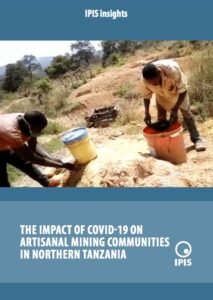Since the outbreak of the COVID-19 pandemic, IPIS closely monitors the impact of the pandemic on 3T+G mines and national supply chains in Tanzania, the Central African Republic (CAR) and the DR Congo. Through structured quantitative and qualitative data collection, IPIS measures the impact on a large amount of mining sites.
IPIS is working through its long-established network of local surveyors who conduct mobile phone surveys and/or have small meetings with local stakeholders between May and September 2020. All activities are executed in full compliance with IPIS’ COVID-19 policy and the applicable national travel restrictions.
Set up as a small qualitative scoping study, this IPIS Insight aims to highlight key elements of the socio-economic impact of Covid-19 measures and restrictions on artisanal mining communities in northern Tanzania, as observed by selected members of these mining communities. Between 5 and 19 May 2020, phone-based interviews were conducted with 37 key informants representing gold, coloured gemstone, diamond, limestone and salt mining communities in Kigoma, Geita, Shinyanga, Mara and Manyara region (N Tanzania).
Informants were questioned on the implementation of preventive measures at mining sites, the impact of Covid-19 on mineral production, prices and trade (compared to pre-Covid-19) and the impact at large on mining communities in northern Tanzania. Follow-up interviews with 10 informants were held between 7 and 14 July 2020 to capture any immediate effects of reduced travel restrictions in/to Tanzania.
In May 2020, the impact of Covid-19 was evident in all artisanal mining communities studied. Mineral production, trade and communities’ livelihoods, directly and indirectly, suffered notably albeit variously from the travel bans, border closures and other preventive measures put in place (inter-)nationally to curb the spread of the virus. Compliance with Covid-19 preventive measures, such as hand washing or social distancing, was attempted at mine sites, although challenging in its execution.
Not restricted by lock-down measures, artisanal mineral production in Tanzania continued, however, often at a reduced pace. Reported reasons for reduced production include reduced worker mobility, the reduced availability of capital, mineral equipment or cheap labour to maintain mining tasks and the reduced demand for certain minerals as, in the absence of often more lucrative international markets, miners are left with local markets only.
Field mineral prices plummeted across all sectors, as mineral trade was hit hard by international travel restrictions. Cut off from their foreign exports markets, the international trade of artisanal gold, tanzanite and diamond was effectively shut down due to Covid-19. In May 2020, the average price paid for a gram of gold was, on average, 22% less than before the outbreak of Covid-19. Diamond and tanzanite prices seemed affected worse, with reported reductions of 60 – 70%. In northern Tanzania, trade continued albeit at reduced levels. Local brokers and dealers are strongly in control, buying at bottom prices, and stock-piling minerals until new opportunities arise. Although less dependent on international trade, limestone and salt miners also reported price and trade disruptions, mainly due to the limited purchasing power of a reduced group of local customers only.
Overall, available income, employment and livelihood opportunities of mining communities were immediately impacted and communities across all studied regions and sectors struggled to secure basic needs.
Follow-up interviews from early July highlight the dynamism of Tanzania’s artisanal mining sector. With travel restrictions lifted, mineral prices – and especially the price of gold – are rising quickly again and miners are optimistic regarding the recovery of their sector. Whether these first steps of economic revival can be translated into a sustainable recovery of mining communities and supply chains in northern Tanzania remains to be seen.
This research is conducted with the support of the European Union.



